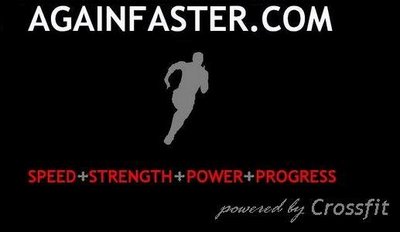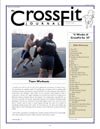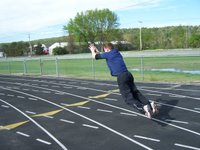Recover Again Faster
Recovery from intense exercise takes effort. Watching Season Two of 24 while eating half a gallon of ice cream does not provide much in the way of recovery. You will not become Jack Bauer by osmosis.
I'm constantly trying to find ways to recover from my workouts faster. I want my muscles to feel fresh, my balance to be on-point, and my coordination to be top notch. This never happens simply by taking time off.
In my limited experience, there are several things you can do to control your rate of recovery. The faster you recover, the faster you'll add strength and speed. You'll make a ton of progress by packing more training into less time.
The most important recovery tool you have is sleep. Sleeping has a restorative effect on the mind and body. It's a period of time where our bodies attempt to fix all the damage we did to them the day before. There is some evidence in the psychology literature (which I'm too lazy to look up--find it yourself) that lack of sleep has tremendous physiological impact, including increased cortisol levels, and eventually, death. Lack of sleep will mess you up. And not in a good way.
All kinds of things screw with a good night's sleep, but I think the most henious offender is alcohol. If you get hammered on Saturday night, you're not going to set any PRs on Sunday. I don't care if you sleep for 15 hours.
Go to bed well hydrated, with some protein and some fat in your stomach. It'll give your body the fuel it needs to fix all the messed up sh*t you did to it. Workouts like Fight Gone Bad (check section 4.2) are going to tear down muscle fiber and leave you in a really deep neurological hole. Ho-hos and Cheetos are not going to help you climb out of it.
Nutrition is the second most important factor in stimulating recovery. Three words--don't eat junk. Organic vegetables and lean meat have always given me the most benefit for my money. Make sure you're getting enough protein, fat, and carbs to support lean body mass. Under-eating is one of the worst things you can do as an athlete. If you're operating at a calorie deficit, you're not going to pack on muscle. Your progress will stall like a 16 year old girl driving a stick shift. If you're going to workout more, you're going to have to eat more.
Certain activities leave me needing more recovery than others. The Olympic lifts and their subparts (Snatch, Clean and Jerk, Clean, Deadlift, all the Squats) take the most out of me. A true max effort on any of these lifts wallops the hell out of your body. A less neurologically taxing workout, like a speed-strength scheme (i.e. more reps at 50% 1RM) following a max effort day leave you ready to rock until your rest day comes up.
If you can alternate the type of demand you're putting on your body, you'll be able to get in more work. For instance, you could do speed work one day, max effort stuff the next, and a simple metabolic conditioning workout on the third day. You might hit the same muscle group over and over, and even do the same exercise with different loads, but you're asking your muscles to do different things. You'll recover from these workouts quickly, given proper sleep and nutrition.
I'm always experimenting with new ways to recover. The foam roller is next on the list of things to buy and use. I've tried contrast showering, but I've found that ice and compression is the most efficient way to reduce post-workout swelling. I haven't tried massage yet, because Boston is not the cheapest place to find a qualified stranger to rub you down. Nonetheless, if you can find an affordable masseuse, give it a shot.
These ideas aren't earth-shattering, but recovery takes effort. If you want to make progress in the gym, you'll need to pay attention to what you're doing outside of it. And for f*ck's sake, stop doing bicep curls in my squat rack...





















0 Comments:
Post a Comment
<< Home